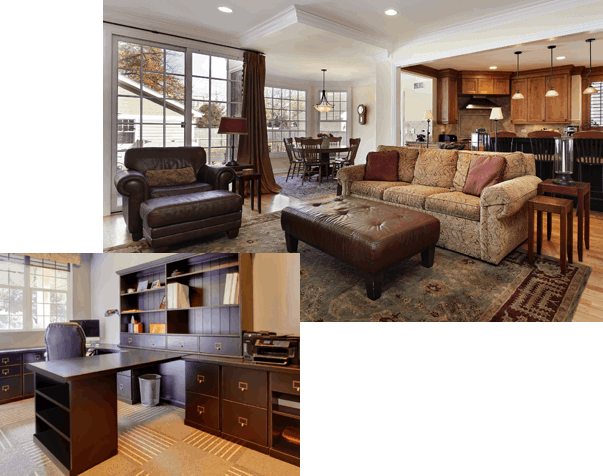What kind of structure is the home where you live?
Do you know where all the doors are? Is it built in such a way that you know who is in your home with you?
Your physical home is controlled by you and those who live with you, right? It’s your place. You wouldn’t put up with strangers sneaking in through hidden passageways, going through your file cabinets, taking notes and rearranging things, right?

But suppose your home were built in such a way that it had secret passageways that didn’t show up on the blueprints and that you didn’t even know about. Suppose that unknown intruders regularly entered your home through those secret passageways, looked through your file cabinets, took notes on your purchasing habits and your political and religious leanings and family situation and age and gender. Suppose the intruders then rearranged files, removed some and inserted a few new ones, including notes for themselves the next time they sneaked in; and suppose that the intruders installed hidden monitoring devices to track and report on your habits, all unbeknownst to you.
As soon as you found out about that, you’d call the police, wouldn’t you? The cops would treat it as a burglary, a criminal offense. A felony.
When the buildings department in city hall found out about the secret passages, the architect and contractor who built the house would stand to lose their professional licenses, their livelihoods. They and the building inspector might even be looking at prison sentences.
Imagine the look of amusement on the judge’s face if the defendants claimed that the violations were for your own good.

A real estate principle called “quiet enjoyment” identifies the sum total of what you, the occupant of a residence or office, are entitled to. Quiet enjoyment means peace and privacy and a building that works the way it’s supposed to. Those hidden passageways would be an extreme, unimaginable and unprecedented breach of quiet enjoyment. It would make the evening news.
Quiet enjoyment is what you have a right to expect in your home, whether you rent or own a house or apartment. The occupancy permit issued by city hall means that the structure is designed and built to provide quiet enjoyment and is therefore legally habitable. If you rent, then city hall’s ordinances mandate that your landlord uphold the standards of quiet enjoyment on an ongoing basis. There may be small breaches of quiet enjoyment from time to time, but surely no hidden passageways with architects and builders and landlords and their “partners” sneaking through and poking through your files.
Your home’s occupancy permit issued by city hall, together with the city’s residential ordinances, assure you that in general, quiet enjoyment is indeed what you have with your first home.

Yes, you do have a second home.
Your second home is the place where you do much of your socializing with friends and friends of friends. It’s where your kids hang out much of their time. It’s where you keep your pictures, your important insurance and health and tax information, your correspondence.
You get to your second home through that glass doorway, your computer, phone or tablet screen. Behind that doorway your second home is built with storage devices both under your fingers and in faraway servers; and with routers, switches, Internet connections between all the places where your information is stored. Most importantly, your second home is built from the software that ties it all together.

You spend more and more of your time in your second home. It’s increasingly the place where you manage your life, entertain yourself, and keep up with friends.
You may think of your computer and phone as devices – things – but when you consider what you do with those things, those activities add up to what you would do in a place. If the general space you inhabit while online is cyberspace, then the particular part of that space, the place you inhabit, is your online home, your information home – your second home.
Your second home isn’t free, of course. Someone, probably you, paid for the devices and services and bandwidth that you use in order to access your second home. Part of that price was the cost of the operating systems that run the devices, and the cost of all the other software. Then there’s the cost of the use of the Internet and the mobile networks.
As with other things you pay for, you own your second home. You are entitled to quiet enjoyment in that which you own, your second home.
Are you getting what you paid for?
Are you getting privacy?
Are you getting quiet enjoyment for your money?
Or are those whom you paid for your second home intruding upon it?
That is, are they burglarizing your second home?
Do they assume that that’s their prerogative? Do they assume they can enter your second home whenever they want, and do whatever they want while there? Do they assume that the second home you purchased and maintain is somehow theirs?
If so, if those who control your second home believe that you are not entitled to quiet enjoyment, then your life in your second home is like the life of a slave on a plantation. Your home is an open shack out back next to the cotton fields.
In that case your masters are not just landlords, because they give themselves the right to intrude upon your living quarters whenever they want, and the right to do whatever they want while there.
If this part of your life – this second home that keeps growing in importance – if that home is controlled from afar by software companies and phone companies and website operators and advertising companies as well as the fraudsters and thieves who sneak in behind the “legitimate” companies, then aren’t you living the life of a slave down on their plantation?
The next implication is clear: they claim ownership of more than just your second home. They consider you to be their property. The masters of your second home, your information home, believe that they own you.
Is that far-fetched?
Not at all. Just consider….
Look at it this way. What is the real principal balance sheet asset of Facebook and Google and Yahoo and Microsoft and Apple and the compilers of spam and phishing mail lists? That is, what is the item of value that they rely upon to generate revenue? Regardless of what their accountants claim, isn’t it true that the principal money-making asset of those companies is the collection of information about you, your habits, relationships, political leanings, purchasing preferences?
If that’s the case, then in the Information Age, ownership of information about you is like owning you.
Face it, we’re all down on their plantation.
That’s the bad news.
The good news is that there is a way to change that. There is a way that lets you claim ownership and control of your second home and all the information in it, so that anyone wishing to use any piece of it must license that information from you.
The solution isn’t really all that difficult. The methods it uses are actually quite old.
Top of Page